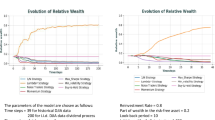Abstract
In an evolutionary dynamic economic theory the accumulation of durable goods (i.e.,wealth) is a key feature. Here we show that the wealth of individual economic agents can be measured by the progress function (PF). PF is a function of goods and money under straightforward assumptions, notably the ‘no-loss’ rule for transactions. We derive explicit formulae for wealth from the PF. We also show how the compatibility of the PF and the neoclassical economics deriving the conventional utility functions from the PF.
Similar content being viewed by others
References
Ayres RU, Martinás K (1990) Self-organization of markets & the approach to equilibrium. Working Paper (WP-90-18), International Institute for Applied Systems Analysis, Laxenburg Austria
Ayres RU, Martinás K (1990) A computable economic progress function. Research Report (WP-90-18), International Institute for Applied Systems Analysis, Laxenburg Austria
Ayres RU, Martinás K (1993) Wealth accumulation & economic progress. Working Paper (93/32/EPS), INSEAD, Fontainebleau, France
Ayres RU, Martinás K (1994) A non-equilibrium evolutionary economic theory. In: Burley S, Foster J (eds) Thermodynamics & Economics. Kluwer, The Netherlands
Ayres RU, Martinás K (1994) Entropy, physical information & economic values. Working Paper (94/05/EPS), INSEAD, Fontainebleau, France
Bródy, András, Martinás K, Sajó K (1994) Essay on macroeconomics. In Burley S, Foster J (eds) Thermodynamics & Economics, Kluwer, The Netherlands
Conlisk, John C (1996) Why Bounded Rationality? J of Economic Literature 34:669–700
Cyert R, March J (1963) A behavioral theory of the firm. Englewood Cliffs, Prentice-Hall (1963)
Kreps DM (1990) A course in microeconomic theory. Harvester Wheatsheaf, New York
Martinás K (1989) About irreversibility in microeconomics. Research Report (AHFT-89-1), Department of Low Temperature Physics, Roland Eotvos University. Budapest
Martinás K, Aryes RU (1993) Entropy, information & evolutionary selection. Working Paper (93/59/EPS), INSEAD, Fontainebleau, France
Plott CR (1986) Laboratory experiments in economics: The implications of posted price institutions. Science 232:732–738
Ramsey FP (1928) A mathematical theory of saving. Economics Journal 38:543–559
Sargent TJ, Hansen LP (1981) Linear rational expectations models of dynamically interrelated variables. In: Rational Expectations & Econometric Practice. University of Minnesota Press, Minneapolis
Simon HA (1955) A behavioral model of rational choice. Quarterly Journal of Economics 69:99–118
Simon HA (1959) Theories of decision-making in economics. American Economic Review 49:253–283
Simon HA (1965) Administrative Behavior, 2nd ed. Free Press, New York
Smith VL (1986) Experimental methods in the political economy of exchange. Science 234:167–173
Sterman JD (1987) Testing behavioral simulation models by direct experiment. Management Science 33:1572–1592
Sterman JD (1989) Deterministic chaos in an experimental economic system. International Symposium on Evolutionary Dynamics & Non-Linear Economics, University of Texas, Austin TX
Tversky A, Kahneman D (1974) Judgment under uncertainty: Heuristics & biases. Science 185:1124–1131
Tversky A, Kahneman D (1981) The framing of decisions & the psychology of choice. Science 211:453–458
Tversky A, Kahneman D (1987) Rational choice & the framing of decisions. In: Hogarth & Reder (eds), Rational choice: The contrast between economics & psychology. University of Chicago Press, Chicago
von Neumann J, Morgenstern O (1944) Theory of games & economic behavior. Princeton University Press, Princeton NJ
Author information
Authors and Affiliations
Rights and permissions
About this article
Cite this article
Ayres, R.U., Martinás, K. Wealth accumulation and economic progress. J Evol Econ 6, 347–359 (1996). https://doi.org/10.1007/BF01202275
Issue Date:
DOI: https://doi.org/10.1007/BF01202275




